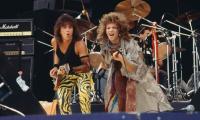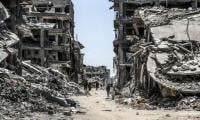Twenty-four-year-old Adnan (name changed to protect identity), a private university student who will cast his first vote in the February 8 elections is brimming with optimism — and for good reasons.
He believes that every person eligible to vote should participate in the process to become a legitimate stakeholder in ‘democracy’ and that one cannot have opinions regarding any government without playing one’s part as a citizen of the country.
Talking to Geo.tv, Adnad said that “It is like getting angry at a company’s management without being a shareholder.” As someone who will enter the corporate world soon, the young man hopes the next government will be business-friendly instead of a statist and market-centric one.
The year 2024 is being termed the biggest election year as it will witness 83 elections in different countries across the globe. One of them is Pakistan’s nationwide elections, finally taking place after multiple delays. These are controversial polls given the controversy and unrest that has surrounded them for months.
The constitution of Pakistan has bestowed upon every citizen of the country the right to self-determination, and everyone is duly encouraged to exercise this right. According to the ECP, casting a vote is not just a fundamental right but also a national duty that the commission urges must be fulfilled.
ECP spokesperson Haroon Khan Shinwari told Geo.tv that “every single vote holds significant importance” as it plays a crucial role in decision-making on behalf of the people. He added: “Citizens are urged to actively engage in the electoral process, contributing to the democratic framework and ensuring their voices shape the future of our nation.”
According to PILDAT, while each faction of society contributes to the electoral process, the largest group of registered voters comprises the 18-35 age group, which is 45% of the population eligible for voting. This age group defines youngsters, who have the most stakes in electoral politics.
“The youth’s disinterest depresses the voter turnout and weakens representative democracy”, said PILDAT President Ahmed Bilal Mehboob during a conversation with Geo.tv. According to him, votes from the youth “can be a game changer” in the elections. But he also raised the question: “will the youngsters come out to vote”? “Youngsters are active [in expressing their opinion] on social media but they usually don’t vote,” he said.
It may be noted that the economic instability and shrinking opportunities drove over 80 thousand skilled and unskilled Pakistanis out of the country in 2022.
Mehboob pointed out that the political parties claiming to represent the youth often lagged at the time of ticketing for elections. He also called for restoring student unions, which he said was an effective way to raise awareness among youngsters on casting votes.
Karachi University’s Peoples Student Federation (PSF) Coordinator Ali Haider voiced similar concerns. He said voting was crucial for shaping the future of a country but students were not showing enough interest in the upcoming elections — neither as candidates nor as voters — due to the absence of student unions, despite big claims by previous leaders to restore these bodies.
“The upcoming elections can and cannot be revolutionary for youngsters, depending on how good the developments and policies the next government brings for them,” Haider added. Nevertheless, he said, students believed in electing their representatives and expected favourable policies in the educational institutions under the next government.
Islami Jamiat-e-Talaba (IJT) spokesperson Advocate Muneeb Ahmed was of the view that individual votes may seem small but collectively they can bring about a significant change and reflect the will of the people, establishing a vibrant democracy.
“Witnessing the past year, students are not very hopeful due to the political unrest and stress in civil-military relations. All these scenarios affect the economy and law and order, consequently affecting the youth,” he said.
However, Ahmed stated that, despite frustration and apathy towards the upcoming polls, there was still hope among students as they see elections as an opportunity to voice their concerns and influence the future.
Meanwhile, All Pakistan Muttahida Students Organization (APMSO) joint in charge Sharjeel Baig Mughal believed that it would be students who would be voting thoughtfully keeping the development of Pakistan in mind.
“This time, the students will ask why their education fee is increased again and again. Only those who will make the education system better and enlighten the future of Pakistan will succeed in the elections,” he said.
Sharjeel said if free and fair polls are staged this time, it is possible that this would be the last election of those “who ruined the education system in Sindh during the last 15 years”.
Speaking to Geo.tv, PML-N senior leader Mohammad Zubair said that Pakistan had undergone a major generational change in terms of circumstances and expectations in current times. He said that today’s youth was comparatively more connected to the world and the opportunities available out there than the people from some decades ago.
“Having far greater stakes in electoral politics, the youth are the most affected by how well or bad Pakistan does in the future, as they have to spend the next 30-40 years of their lives here. The risk is far greater for them than the older generation,” he said.
Zubair said that the young needed to understand that the more they participate in the electoral process via their votes the better the future would be for Pakistan in terms of employment, economic growth, education, and other social indicators.
As for the political parties, the PML-N leader pressed all to understand the generational gap and connect it to the aspirations and expectations of youngsters.
As per the ECP, there are 55 million voters between 18 and 35 years. Recognising the significance of this substantial demographic, the electoral body has proactively directed its efforts towards voter awareness targeting students, civil society, and the media to educate them about the influential role they play in the electoral process, emphasising the impact of their participation.The ECP spokesperson said that they had conducted nearly 2000 awareness workshops in schools, colleges, and universities nationwide over the last 23 months.
Comments came after Trump reprised his complaint that multiple indictments against him were politically motivated
Wins are Labour’s latest in local elections to councils and mayoralties on Thursday
267 raids were conducted against elements involved in Hawala, Hundi and illegal currency exchange
The mountaineer ascended the peak at approximately 8:50am
Fayyaz Watto given additional powers of DG administration
His oath-taking ceremony was scheduled on Sunday which was postponed due to personal reasons







